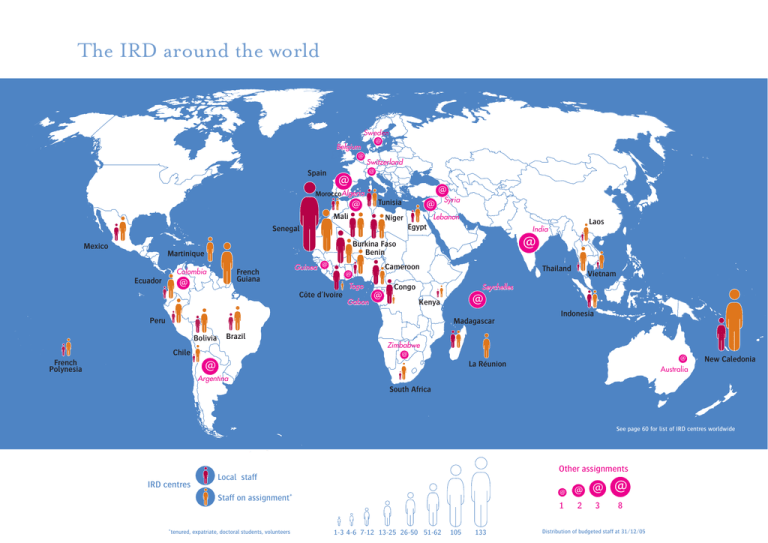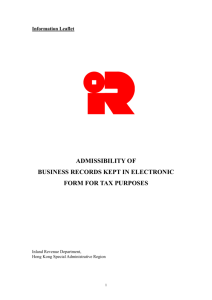The IRD around the world @
advertisement

The IRD around the world Sweden @ Belgium @ Spain Switzerland @ @ @ Algeria MoroccoAlgéria @ Tunisia Mali Syria Lebanon Niger Laos Egypt Senegal India @ Burkina Faso Benin Mexico Martinique Colombia Ecuador @ French Guiana @ Guinea @ Cameroon Thailand @ Togo Côte d’Ivoire Gabon Seychelles Congo @ Vietnam @ Kenya Indonesia Peru Madagascar Bolivia Brazil Zimbabwe Chile French Polynesia @ @ La Réunion @ New Caledonia Australia Argentina South Africa See page 60 for list of IRD centres worldwide Other assignments IRD centres Local staff Staff on assignment* *tenured, expatriate, doctoral students, volunteers 1-3 4-6 7-12 13-25 26-50 51-62 105 133 @ @ 1 2 @ @ 3 8 Distribution of budgeted staff at 31/12/05 3 EditOrial For the IRD, 2005 was a year of continued hard work in pursuit of its established priorities. Scientific output increased and new projects, in line geographical priorities, began. There were also some crucial strategic changes. On the research side, there was more than one publication per researcher - the rate has been increasing by 7% a year for three years - and some widely noted results, such as the discovery of an Ebola virus reservoir in bats in Gabon. Two campaigns, Amadeus and Esmeraldas, explored major earthquake zone off the coasts of Peru, Ecuador and Colombia. As regards international research programmes in priority geographical areas, the Institute was an active partner in the African Monsoon Multidisciplinary Analyses programme (AMMA) and the Water programme of the New Partnership for Africa’s Development (NEPAD), for which it is now the coordinating agency. It developed regional dynamics in the South, for example in the Andean countries, and started to promote South-South partnerships. The IRD’s presence in the Mediterranean region was also intensified, with a centre opening in Morocco. The Institute was also working to strengthen research capacities in the French tropical overseas territories, as witness its support for the SEAS Guyane remote sensing platform and its involvement right from the start of the chikungunya epidemic that hit La Réunion and neighbouring Indian Ocean countries. The IRD immediately mobilised its scientists and reinforced its resources to combat the illness, playing its part in the structures set up by the authorities. Most important, in 2005 the IRD was examining strategic issues and working on a new contract with the State, its contrat d’objectifs or action plan for 2006-2009. Scientific and geographical priorities were set in accordance with the recommendations of the Strategic Audit Committee, in the light of development challenges and with a view to affirming the IRD’s role as a major actor in national and international policy for the South. In this connection the Interministerial Committee for International Cooperation has appointed the IRD as lead agency to mobilise all French universities and research bodies. With its recent, tighter organisation into 79 research and service units including 28 joint units, the IRD can respond to major development challenges as it focuses on its scientific priorities: poverty reduction, international migration, emerging infectious diseases, climate change, water resources and access to water, and ecosystems and natural resources. On the strength of this strategic repositioning, its network of centres around the world, its 2,256 staff, its recognised work in partnership with the South and its role in training for the Southern scientific community, the IRD is well placed today to fulfil the extended mission the government has given it. Jean-François GIRARD Chairman Michel LAURENT Director General Highlights of 2005 IRD partners 25th international population congress At the 25th international population congress in Tours, France, on 18-23 July, attended by over 2000 researchers from 108 countries, the IRD took an active part in discussions about the challenges of world demography in the 21st century. Exploratory surveys study major South American earthquakes Two marine geophysics surveys, Amadeus and Esmeraldas, were conducted off the coasts of Ecuador and Colombia. Their purpose is to improve understanding of major earthquakes and make simulations of tsunami propagation more reliable. Satellite observation of the Amazonian environment Ebola virus research in Gabon New objectives contract Evaluating overfishing The IRD and the responsible authorities drew up the Institute’s new objectives contract for 20062009. The contract defines scientific and geographical priorities for addressing the world’s major development challenges. The IRD was entrusted with a new function: as lead agency for development research, it is responsible for stimulating research in this field and drawing together the entire French scientific community, in research organisations and universities alike. According to IRD scientists, stocks have crashed in a quarter of the world’s fisheries over the past fifty years. In 21% of cases the collapse is preceded by a plateau of stable production and is therefore not foreseeable. These unpredictable collapses are a result of increasingly efficient fishing equipment technology and the difficulty for depleted fish populations to regenerate. Morocco: new IRD centre in Rabat African monsoon: first assessment of the AMMA programme Continuing its commitment to Mediterranean countries, the IRD opened its new centre in Morocco on 30 June. The IRD took part in the AMMA programme’s first international conference in Dakar. Over 250 researchers met to review ongoing work and discuss future directions for this huge programme, which is designed to improve understanding of the mechanisms underlying the African monsoon and its impact on climate and population. Ebola fever: bats a reservoir for the virus In Gabon, IRD scientists and their partners have identified bats as one of the natural reservoirs for the Ebola fever virus. Since 2001 this virus has caused several violent epidemics of haemorrhagic fever in the Republic of Congo and Gabon. IRD helps fight Chikungunya epidemic Building on its experience in medical entomology the IRD mobilised its researchers to combat the Chikungunya epidemic in la Réunion, as part of the Chikungunya epidemic control support mission launched by the French health and overseas territories ministries. 4 SEAS Guyane, an environmental monitoring platform for Amazonia, based on satellite remote sensing, was set up in Cayenne in French Guyana. The IRD will run the image receiving and processing station. IRD leads NEPAD water programme As part of the boost for research in Africa initiated by NEPAD, The New Partnership for Africa’s Development, the French foreign affairs ministry commissioned the IRD to coordinate all French research on water science and technology. The IRD was one of the organising bodies for a meeting of French and African experts, held in Nairobi, to start building a network of African centres of excellence in this field. 5 The IRD in a nutshell Key figures of 2005 167.35 195.2 Research for development Founded in 1944, the Institut de Recherche pour le Développement is a French public research institute under the joint authority of the French ministries responsible for research and for overseas development. The IRD works in Africa, Asia, the Indian Ocean, Latin America and the Pacific, conducting multidisciplinary research for the purposes of economic, social and cultural development in Southern countries. Its work is focused on the relations between humans and their environment in tropical and Mediterranean regions, with a view to sustainable development. Lead agency in research for the South Through its role as a government agency, the IRD mobilises the French scientific community for research that will assist development. Continuous assessment ensures excellence in the research the IRD conducts, as witness its scientists’ increasing participation in national, European and international programmes in Southern countries. Dynamic partnership The IRD’s research projects are conducted in partnership with Southern institutions. The Institute also designs and provides training to build the capacities of the Southern countries’ own scientific communities. It works to transfer knowledge to economic and social actors and to find applications for its research results. Its dissemination of scientific and technical information is a further contribution to knowledge sharing. 2 256 M€ total budget staff 971 staff outside mainland France (43%) 79 research and service units 205 760 grants and fellowships awarded to scientists from the South (studentships and appointments) publications recorded in the Science Citation Index (excl. social sciences) 13.34 72 % Incl 794 797 665 34 % 71 % 155 Incl 28 105 53 43 4 M€ government subsidy M€ own resources, mainly from research contracts allocated to payroll researchers engineers and technicians local and non-tenured staff of staff in mainland France work in partner institutions’ structures of staff abroad work in Africa long-term missions joint research units with other French research organisations and universities thesis grants scientific exchange fellowships in-service training grants post doctorals’ grants Over 1 publication per researcher per year 40 % of articles jointly signed with Southern partners Annual report 2005






